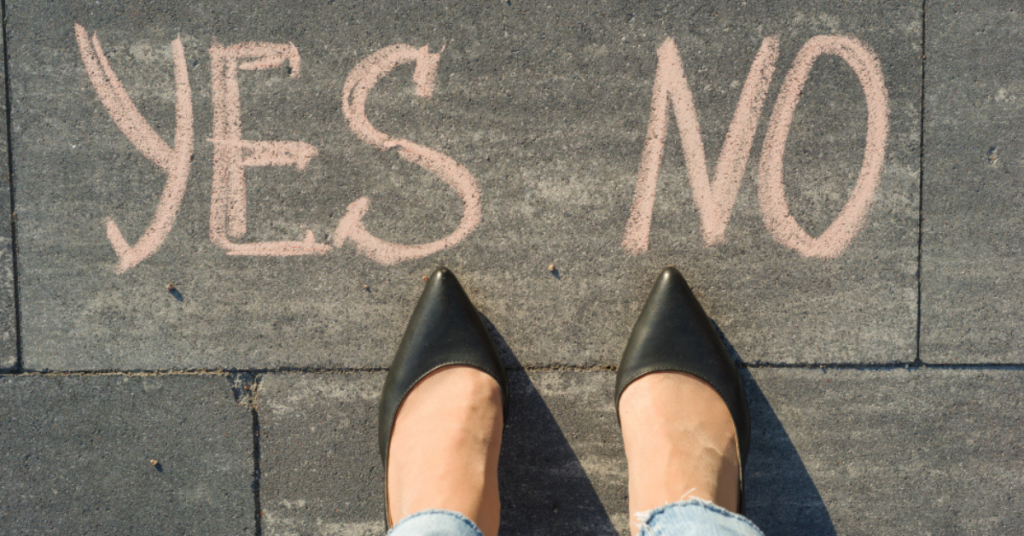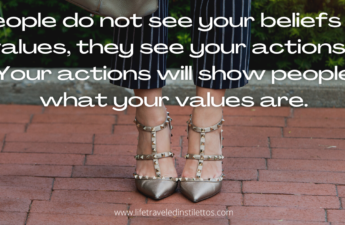The non-stop barrage of YES and NO questions we face on a daily, and perhaps sometimes on an hourly basis can have our heads spinning in two different directions at once. We are told to say YES to adventures, YES to living your good life, YES to opportunities, and NO to anything that doesn’t support our dreams, NO to sugar, carbs or anything else bad we crave, and NO to abuse or treatment from others that kill our self-esteem.
For the most part, the daily decisions we are faced with are simple, and a YES or NO response is easy to make — like, “Would you like extra room for cream?” “Can you do the car pool drive today?”. But what about those times where our “yeses” and “no’s” cause anxiety, guilt, or the fear of missing out. What happens when we are faced with a tough decision, and the weighing of pros and cons grabs hold and wrecks havoc with our emotions. Is there ever a clear cut way to know when and how to make the best decision between a “yes” and a “no”?
It’s a maddening conflicting game of figuring out what decisions will benefit us the most, or which ones will cause undue harm and adverse consequences, leaving us second guessing if we are making the right decision. For some, this constant game of YES or NO, can leave many riddled with anxieties and paralyzed in a barbed wire encasement of fear when they can’t make up their minds or worse when they end of making decisions that are contrary to the life one wants to live.
Every Decision You Make Requires A Trade Off
When faced with a tough decision, be more cognizant of what you are gaining or giving up in the process. Look at your goals and what decisions you are currently making that may be keeping you from reaching them. Are you making decisions based on not wanting to give up something else that you know you should just release? Do you put obstacles in your path to avoid having to face fears with your decision making? The answers to those personal deep reaching questions will help you with making wise decisions.
Making a choice between a YES and a NO in many cases requires you to trade one want or need for another. If your goal is to be healthier then your trade off is saying no to sugary delights and yes to nutrient rich foods. If you want to accomplish more in the morning, saying no to late night Netflix binging sessions will be a trade off to saying yes to activities that will encourage a good night’s sleep.
In some cases, your decision making will directly relate to a goal you have for yourself. This is where recognizing how the trade off between a YES and NO will either lead to reaching your goals or falling short of them.
Here are a few trade off decisions and how they affect your ability to give a YES or No:
- You say yes to things that distract you from a task that must be done. Saying yes to these activities will cause you to miss deadlines, or not allow the work to get done.
- Saying no to chit chat and daily gossip, may mean you cannot be as polite with others when you tell them you can’t talk right now. But that no will allow you to say yes to getting your work done in a timely manner.
- If saying yes to extra curricular activities and agreeing to help others eats into precious family time, you will end up having to make a tradeoff — your family’s wellbeing or the wellbeing of others.
Why Do We Say Yes To Things We Know We Should Say No To?
One of the biggest reasons we tend to agree to things, or have a hard time saying no to someone, stems from our fear of not wanting to disappoint someone. We are consumed with people pleasing and tend to say yes to things, because of the fear that saying no will cause someone not to like us, not to love us, and we don’t want to end up being seen us as unreliable. People end up being more afraid of how their decision will affect the other person and not taking into account how it will affect their life.
There are times we say yes to seemingly harmless things, like that extra cookie or two, that one more drink at the bar, or those too cute shoes that happen to be on sale. But when we are dieting, need to get home to our families, or are slipping into debt, those harmless yeses may not seem as pleasurable in the long run. In many cases the accumulation of too many bad yes decisions will end up causing more problems down the road.
When we say yes to things we know we should say no to, we end up over stretching our schedules trying to be Super Woman. This leads to us having to take time away from more important things and people that should be our priority. Honestly, we can all relate. That last minute call from a friend asking to do the car pool again when you have a prior commitment, your boss asking you to take on more responsibility and your fear that you won’t be seen as a team player, or the offer to volunteer for a worthy cause can leave us frazzled if we already have a dance card full of other commitments and responsibilities.
There Are Consequences To Our YES and NOs
Saying yes to something that you know you shouldn’t have said yes to in the first place, can, many times, lead to unintended consequences. Having that extra piece of chocolate cake, will keep you from getting into your favorite pair of jeans or wrecking havoc on your health, deciding to take that little white pill your friends convince you to take can lead you down a path of addiction and despair, or saying yes to too many events, activities, or volunteer positions can leave you burnt out, frayed at the seems, and less time to devote to the things that actually matter — like your children or spouse/partner.
The same goes with saying no to things that you should have said yes to. Saying no to something out of fear, like accepting a new opportunity, going out with friends to get you out of a negative funk, or saying no to travel, learning new things, or challenging yourself will only keep you from living your fullest life.
How to avoid small or large consequences with your decisions
- Be more aware of the decisions you make and how they will affect the areas in your life that you are trying to improve
- Take a look at your past decisions, have they led to negative results that have caused more stress, anxiety, or problems with your relationships? Learn to stop agreeing to things that create more problems.
- Find the root cause of poor decision making. Are you avoiding fear, disappointing others, or are you using distractions to avoid making a decision in the first place.
Strategies For Making The Right Decision
When trying to evaluate whether if saying YES or NO to something is the wise and right choice, it is important to break the decision making into smaller questions.
- What is the decision you need to make?
- What area will this affect your life? Physical, Financial, or Emotional?
- Identify the potential dangers or the potential upsides.
- Gather facts, not imagined fears. Too often people tend to focus on the unrealistic fears — the theoretic “what ifs”, instead of the odds of their fears actually happening.
- Look at your past results from making the same decisions over and over again in the same situation. Has the sum of your decisions been a positive effect in your life (increased time with love one, learning new skills to better your career, heathy changes to your life style), or have the decisions you’ve made led to more negative effects in your life (staying up late, drinking too much, eating unhealthy foods, taking on too many projects that leave you stressed).
- Train yourself to avoid temptations or to learn habits that keep you from poor decision making.
- Create a schedule of your activities and be honest with yourself and your time before committing to any more projects.
- Look at your goals and see if your decisions align or hinder your ability to reach them.
- Gauge your decision making progress. Ask yourself, “are my decisions leading me to the life I truly want for myself?’.
Once you know what your answer will be, it’s time to put into practice the ways to say YES or NO.
Learning to Say NO
NO. Two simple letters, but saying them is not always easy for some people — especially for people pleasers. We tend to forget that is ok to want to help others and say yes, but it is also important to know that your ability to help others isn’t always possible.
It takes practice to learn to say no to things that are not good for us and to say no to people when our schedules can not accommodate. In fact, learning to say no is a form of self-care that helps balance out our crazy, hectic lives.
When should you say no to something or someone:
- When you need to set boundaries with friends, colleagues, or loved ones.
- When your schedule does not afford any more time.
- When saying yes goes against your core values and beliefs.
- Will saying yes worsen your anxieties or mental health?
- Will saying no allow you to focus on your personal goals?
When saying no is the right decision, here are some polite ways to say the word.
- I’m honored, but I can’t.
- I’m sorry but I won’t be able to give this project the attention it deserves.
- It’s difficult for me to say no, but I need to pass this time.
- I wished I could, but I’m committed to eating healthier.
- Thank you for inviting me, but I already have a commitment, maybe next time.
- This is something that goes against my beliefs.
- This is family night, and I’ve made a commitment to my children and spouse.
- I can not car pool tonight, but I can next week.
- Unfortunately that will not work with my schedule.
It may be uncomfortable for you at first, but the more you are honest with yourself and your current schedule, the easier saying no will become.
When a YES is best
There are times that saying YES to something will lead to greater opportunities and a better mental outlook. Just as it is hard for some of us to say no to people and things, it can be equally difficult saying yes.
It takes courage to change the unhealthy patterns of our life — and it takes practice. For you to grow as a person, it will be important for you to say yes to the activities and people that will help you reach your goals.
You may find it intimidating to join a class or networking group, but saying yes to these activities will lead to greater career opportunities. It may be challenging to start a new diet or exercise program, but saying yes will improve your health and make you stronger. Instead of staying home and watching television, say yes to the invitation to do a GNO. If you are bored, say yes to trying out a new hobby. If you want to launch a new business, say yes to carving out time in your schedule to focus on it. If you have been dealing with the stresses of life, say yes to mentally calming activities and taking guilt-free time for yourself.
In The End, Your Decision Will Ultimately Lead You To What Matters The Most
The important thing to remember is to practice good decision making everyday. Be conscience of every action and how our choices ultimately effect our lives and the time we have to pursue the things that truly matter.
When you become more conscious of how your current decisions are effecting your life – relationships, career, health – the better you will get at making decisions that will lead to positive results. In the end, what you say YES or NO to will point to what is more important in your life — which is you and your well-being.

Drop a comment below and let us know what types of decisions you struggle with the most. Is it saying NO, or saying YES? Be sure to “Like”, “Share”, “Tweet”, “Link”, or “Pin” this article.




